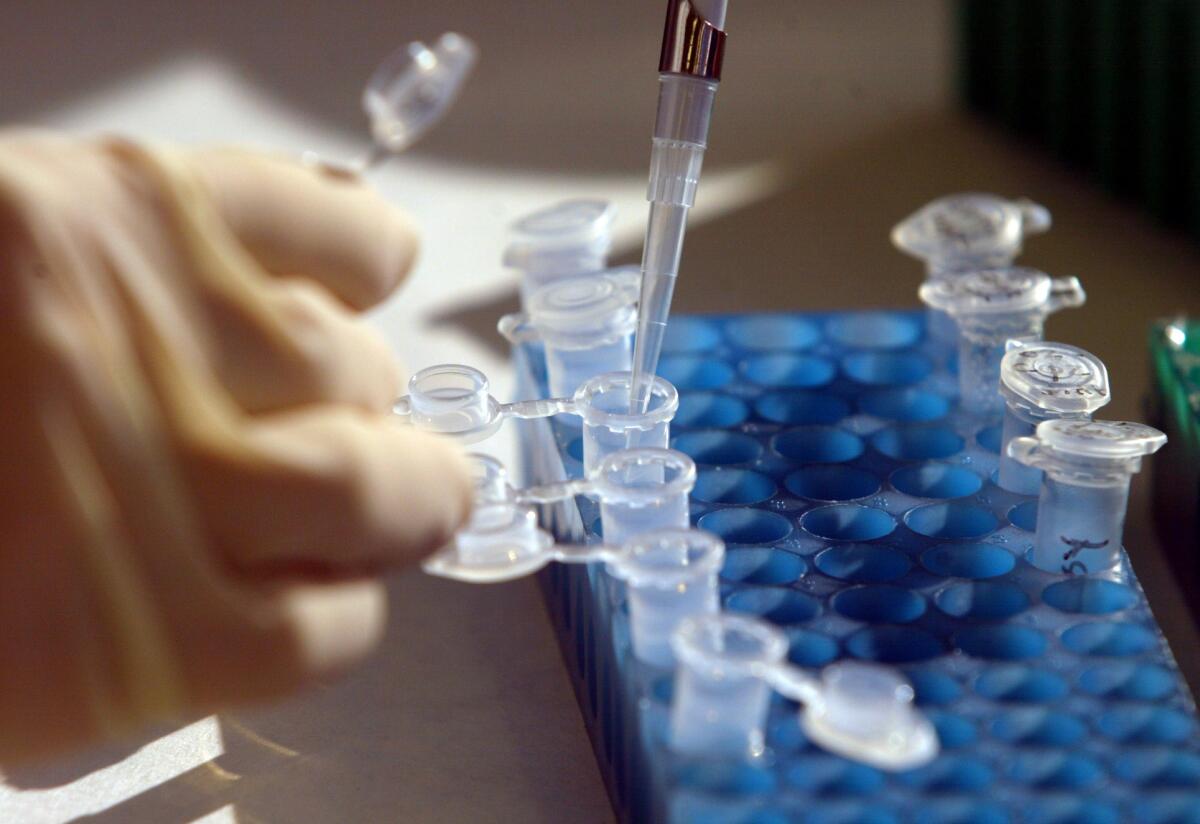Court upholds practice of swabbing individuals for DNA upon arrest

- Share via
SAN FRANCISCO — Law enforcement in California may continue to collect DNA from people arrested for felonies — even if they are never formally charged — and store the genetic profiles in a criminal database, a federal appeals court ruled Thursday.
An 11-judge panel of the U.S. 9th Circuit Court of Appeals upheld a district court decision that refused to shut down the state’s practice of swabbing individuals for DNA upon arrest. The 9th Circuit said California’s practice was “clearly” constitutional under a Supreme Court decision last year that upheld a similar, but narrower, program in Maryland.
The Supreme Court, in Maryland vs. King, ruled 5 to 4 that swabbing for DNA was akin to taking fingerprints and therefore a legitimate part of the police booking process.
But the American Civil Liberties Union of Northern California, which filed the case on behalf of arrestees who were not convicted of any crime, argued that California’s program was different from Maryland’s and should be blocked.
Michael T. Risher, an ACLU lawyer, said Thursday the group might ask a lower district court for a more narrow injunction that would stop the state from collecting or holding DNA from suspects arrested for relatively minor crimes and never charged. The challenge before the 9th Circuit was broader — aimed at the entire arrestee collection — and a district court already had rejected it.
“We haven’t decided exactly what we are going to do,” Risher said. “Everything is on the table.”
The 9th Circuit dispatched the long-standing ACLU challenge with a four-paragraph, unsigned ruling. The court refused to say how it might rule on a request for a more limited injunction, noting the issue first had to be raised in a trial court.
The ACLU had argued that California’s arrestee DNA collection was more far more intrusive than Maryland’s. Maryland destroys the genetic evidence from those who are not convicted, while California puts the burden on such individuals to seek expungement.
Unless someone applies to have his or her DNA profile removed, California stores it indefinitely in a criminal database used by law enforcement to match evidence left at crime scenes to suspects.
According to the state attorney general’s website, more than 96% of requests for removal are granted. A spokesperson for the attorney general did not respond to a request for specific numbers about applications for expungements.
About 300,000 people in California are arrested each year for felonies, and a third are not convicted, Risher said. He said fewer than 100 people have applied for expungements, and the criminal database probably contains tens of thousands of DNA profiles of people who were not convicted after their arrests.
“A tiny, tiny percentage of people who are arrested apply for expungement,” he said. “They don’t know how to do it, and they don’t want to have to hire a lawyer to deal with it.”
California also processes the DNA even if the arrestee is never formally charged. Maryland waits for the arraignment.
Judge Milan D. Smith Jr., in a concurrence, called the difference in the programs “illusory” and “materially indistinguishable.”
He said any attempt by the ACLU to obtain a more narrow injunction would be “futile” and faulted the majority for failing to state that.
“This case is over,” Smith wrote, “and the district court has no obligation to give the plaintiffs an opportunity to amend their complaint.”
A three-judge 9th Circuit panel previously ruled 2 to 1 to uphold California’s program. The court agreed to review that decision en banc, and then put the case on hold until the Supreme Court decided the Maryland challenge.
California voters authorized a vast expansion of DNA collection when they passed Proposition 69 in 2004, but a provision that authorized taking genetic material upon arrest did not take effect until 2009.
More to Read
Sign up for Essential California
The most important California stories and recommendations in your inbox every morning.
You may occasionally receive promotional content from the Los Angeles Times.











